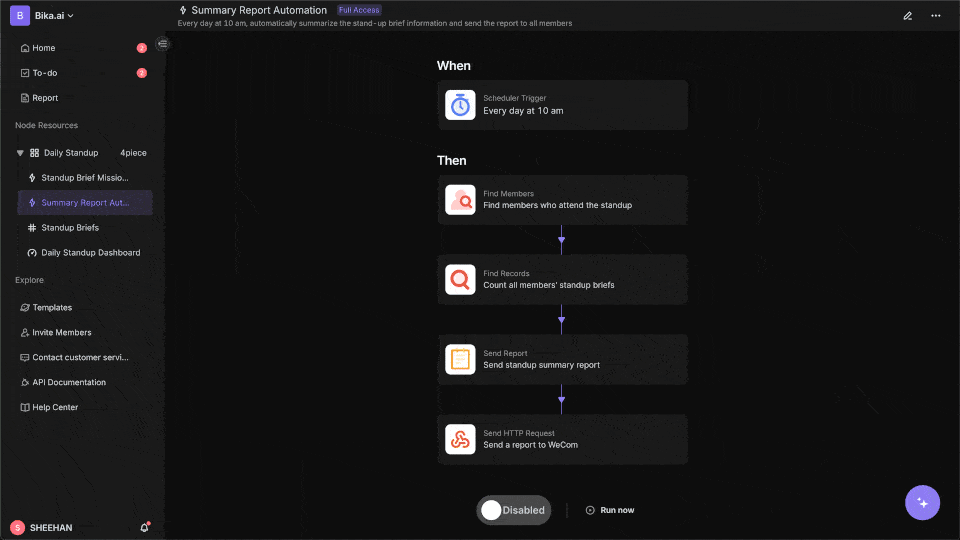
Grow Faster, Work Less: Top Marketing Automation Tools for Startups
Why Marketing Automation is Crucial for Startups in 2025
In 2025, startups are navigating a highly competitive business landscape with a unique set of challenges. Limited budgets and small teams are the norm, yet the need for rapid growth is ever - present. Marketing is a key driver of this growth, but traditional, manual marketing methods can be time - consuming and resource - intensive, stretching these scarce resources thin.
Marketing automation, at its core, is the use of software to automate marketing tasks. These tasks can range from sending out email campaigns, managing social media posts, to tracking customer interactions. For startups, marketing automation tools are a game - changer. They offer a cost - effective way to scale marketing efforts without a proportional increase in headcount.
The benefits of marketing automation tools for start - ups are numerous. Firstly, efficiency is significantly enhanced. Repetitive tasks such as sending welcome emails, follow - up messages, or scheduling social media posts can be automated, freeing up valuable time for marketing teams to focus on more strategic initiatives. For example, instead of spending hours each week manually sending out email newsletters, an automated system can do it in a matter of minutes.
Secondly, consistent lead nurturing becomes possible. Startups often struggle to maintain a regular communication cadence with leads. Marketing automation tools can be programmed to send personalized messages based on a lead's behavior, such as when they visit a particular page on the website or download an e - book. This helps in building relationships with potential customers over time, increasing the likelihood of conversion.
Personalized communication is another major advantage. By leveraging data collected from various touchpoints, startups can create tailored marketing messages for different segments of their audience. This not only improves the customer experience but also boosts engagement rates. For instance, an e - commerce startup can send product recommendations based on a customer's past purchases.
Data - driven decisions are also facilitated. Marketing automation tools provide detailed analytics on campaign performance, lead behavior, and customer engagement. Startups can use this data to optimize their marketing strategies, allocate resources more effectively, and focus on the channels and tactics that are delivering the best results.
Finally, scalability is a key benefit. As startups grow, their marketing needs become more complex. Marketing automation tools can easily adapt to these changing requirements, allowing startups to expand their marketing efforts without major disruptions.
:::: key-takeaways ::::
- Marketing automation tools boost efficiency by automating repetitive tasks, saving time for strategic marketing work.
- They enable consistent lead nurturing, increasing the chances of converting leads into customers.
- Personalized communication and data - driven decision - making are made possible, enhancing customer engagement and optimizing marketing strategies.
- These tools are scalable, growing with the startup's marketing needs. ::::
Top Marketing Automation Tools for Startups
In this section, we'll explore some of the leading marketing automation tools that are well - suited for startups. These tools have been carefully curated based on their features, pricing, and overall value for early - stage businesses.
Brevo
Brevo is a comprehensive marketing automation platform that offers a wide range of features. Its core strength lies in its user - friendly interface, making it an excellent choice for startups with limited marketing technology experience. It's particularly well - suited for startups in the e - commerce, SaaS, and service - based industries.
Key Features:
- Email Marketing: Brevo provides an easy - to - use email editor, allowing startups to create professional - looking emails quickly. It also offers advanced segmentation capabilities, enabling targeted email campaigns.
- CRM Integration: Seamlessly integrates with popular CRM systems, ensuring that marketing and sales teams are on the same page. This helps in tracking customer interactions across different touchpoints.
- Landing Pages: Allows startups to create custom landing pages without the need for extensive coding knowledge. These landing pages can be optimized for lead generation.
- Analytics: Offers detailed analytics on email campaign performance, such as open rates, click - through rates, and conversion rates.
- Pricing Model: Brevo offers a free plan with basic features, making it accessible for startups on a tight budget. It also has paid plans with more advanced features, which scale as the startup grows.
Pros:
- User - friendly, ideal for non - technical teams.
- Cost - effective, especially with the free plan option.
- Good for building basic marketing automation workflows.
Cons:
- Some advanced features may require a steeper learning curve compared to more specialized tools.
- Customization options for certain features may be limited.
HubSpot
HubSpot is a well - known name in the marketing automation space. It offers an all - in - one platform that combines marketing, sales, and customer service tools. Startups looking for a comprehensive solution to manage their entire customer journey will find HubSpot appealing.
Key Features:
- Email Marketing: HubSpot's email marketing tools are highly customizable, allowing for personalized and targeted email campaigns. It also has built - in A/B testing capabilities to optimize email performance.
- Lead Scoring: Helps startups prioritize leads based on their behavior and engagement. This ensures that sales teams focus on the most promising leads.
- CRM: A robust CRM system that stores all customer data in one place, providing a 360 - degree view of the customer.
- Content Management: Allows startups to create and manage blog posts, landing pages, and other marketing content.
- Analytics: Provides in - depth analytics on marketing campaigns, lead generation, and customer engagement.
Pricing Model: HubSpot offers a free CRM, and its marketing automation plans start from a basic tier with essential features. Higher - tier plans offer more advanced functionality.
Pros:
- Comprehensive suite of tools, reducing the need for multiple integrations.
- Excellent for inbound marketing strategies.
- Strong customer support and a large community for learning.
Cons:
- Can be relatively expensive, especially for startups on a tight budget.
- The platform's complexity may be overwhelming for very small teams.
Customer.io
Customer.io is a marketing automation tool that focuses on customer - centric messaging. It's designed to help startups deliver the right message to the right customer at the right time. This makes it a great fit for startups that want to build strong, personalized relationships with their customers.
Key Features:
- Triggered Emails: Allows startups to send highly targeted, triggered emails based on customer actions, such as signing up, making a purchase, or abandoning a cart.
- Segmentation: Offers advanced segmentation capabilities, enabling startups to divide their customer base into distinct groups for more personalized messaging.
- Data - Driven Insights: Provides detailed insights into customer behavior, helping startups understand what drives their customers' actions.
- Integrations: Integrates with a variety of other tools, including CRMs and e - commerce platforms.
Pricing Model: Customer.io has a flexible pricing model based on the number of active customers and the features required. It offers a free trial to let startups test the platform.
Pros:
- Excellent for personalized, behavior - based messaging.
- User - friendly interface for creating and managing campaigns.
- Good for startups focused on customer retention.
Cons:
- May not be the most cost - effective for startups with very large customer bases.
- Some users may find the reporting capabilities less comprehensive compared to other tools.
Mailchimp
Mailchimp is a popular marketing automation tool, especially known for its email marketing capabilities. It's a great option for startups that are primarily focused on building and growing their email lists and running effective email campaigns.
Key Features:
- Email Marketing: Mailchimp offers a drag - and - drop email editor, making it easy to create visually appealing emails. It also has a wide range of templates to choose from.
- Audience Segmentation: Allows startups to segment their email lists based on various criteria, such as demographics, behavior, and purchase history.
- Automation Workflows: Offers pre - built automation workflows, such as welcome emails, abandoned cart reminders, and anniversary emails.
- E - commerce Integration: Integrates well with popular e - commerce platforms, enabling startups to track and target customers based on their purchase behavior.
Pricing Model: Mailchimp has a free plan for small lists, which is great for startups just starting out. Its paid plans offer more advanced features and higher email sending limits.
Pros:
- Easy to use, especially for beginners in email marketing.
- Cost - effective, with a free plan option.
- Good for e - commerce startups.
Cons:
- Some advanced marketing automation features may be limited compared to more comprehensive tools.
- The free plan has certain restrictions, such as email sending limits.
Essential Features to Look for in Marketing Automation Tools for Your Startup
When choosing marketing automation tools for your startup, several key features and considerations should be at the forefront of your decision - making process.
Ease of Use/User Interface: Startups often have limited time and resources for training. A tool with an intuitive user interface will ensure that your marketing team can quickly get up to speed and start using the tool effectively. Look for platforms with clear dashboards, easy - to - navigate menus, and straightforward workflows.
Pricing/Scalability: Given the budget constraints of startups, pricing is a crucial factor. Look for tools that offer a freemium model or affordable entry - level plans. Additionally, the tool should be scalable, meaning that as your startup grows and your marketing needs become more complex, you can easily upgrade to a higher - tier plan without having to switch to a completely different tool.
Core functionalities:
- Email Marketing: Email remains a powerful marketing channel. Ensure the tool has a robust email marketing feature set, including email design capabilities, list management, and campaign tracking.
- Lead Scoring: This helps in identifying the most promising leads, allowing your sales team to focus their efforts more effectively.
- CRM Integration: Integrating with a CRM system ensures seamless communication between marketing and sales, enabling a more coordinated approach to customer acquisition and retention.
- Analytics: Detailed analytics are essential for measuring the success of your marketing campaigns and making data - driven decisions. Look for tools that provide insights into key metrics such as open rates, click - through rates, and conversion rates.
Integration capabilities: Startups often use a variety of other tools, such as CRM systems, sales tools, and website builders. The marketing automation tool should be able to integrate with these existing tools to ensure a smooth flow of data and seamless operation.
Customer Support & Resources: In case you run into issues or need help getting started, reliable customer support is crucial. Look for tools that offer multiple channels of support, such as live chat, email, and phone. Additionally, resources like documentation, tutorials, and webinars can be extremely helpful for learning how to use the tool effectively.
When making the final choice, keep in mind that the ideal marketing automation tools for start - ups should meet your current needs while also having the flexibility to grow with your business.
Beyond Standalone Tools: Elevating Marketing Automation with Workflow Integration
While the marketing automation tools discussed above are powerful on their own, they can be even more effective when integrated into a broader, automated workflow. Standalone tools typically handle specific tasks, such as email marketing or lead scoring. However, platforms like Bika.ai can orchestrate complex, cross - platform campaigns.
By integrating your marketing automation tools with Bika.ai, you can achieve deeper personalization. For example, data from your CRM system can be used to create highly targeted email campaigns, ensuring that each customer receives a message that is relevant to their interests and past interactions.
Seamless data flow between systems is another major benefit. Information can flow automatically from your sales tools to your marketing automation platform, enabling more informed marketing decisions. This also allows for the creation of automated customer journeys, where a customer's experience is carefully mapped out and automated across different touchpoints.
Operational efficiency is significantly enhanced. Instead of manually transferring data or triggering actions between different tools, Bika.ai can automate these processes, reducing the risk of errors and saving time.
Bika.ai is a powerful platform that enhances the capabilities of your chosen marketing automation tools. It provides a user - friendly interface for creating and managing complex automation workflows, even for those without extensive technical knowledge.

Real - World Automation: The Bika.ai AI Automated X Tweets Template for ``
The AI Automated X Tweets Template on Bika.ai is a prime example of how marketing automation can be taken to the next level. This template is designed to address the common challenge of managing an X (Twitter) account, which requires consistent activity.
Normally, posting tweets daily involves a time - consuming manual process of writing, copying, and posting. The "AI Automated X Tweets" template streamlines this by allowing users to schedule and automate tweets.
How the Template Works:
- Database: "X Tweet Content": This stores pre - written tweets along with their scheduled posting dates.
- Automation: "AI Automated X Tweets": Runs daily at 10:00 AM, retrieves tweets scheduled for that day from the database, and posts them to the X (Twitter) account via the X API.
Steps to Use:
- Install the Template: Install it into your Bika.ai space. Multiple installations are possible if you manage multiple X accounts with different themes.
- Add New Tweets: Use the pre - built "X Tweet Content" database. Enter the tweet text in the "Content" field and set a "Posting Date".
- Configure the Automation: Adjust the trigger (scheduled task for tweet posting time) and action configurations (such as retrieving tweets, uploading media if any, and posting tweets).
- Test the Automation: Click "Run Now" in the automation editing interface to check if tweets are posted successfully.
- Enable the Automation: Once tested, click "Enable" to activate the daily tweet - posting automation.
This template is ideal for social media managers, businesses looking to automate their marketing campaigns, and individuals or influencers aiming to increase their social media presence.
Key Features:
- Consistency: Ensures a regular stream of posts, which is crucial for audience engagement. For example, a startup can schedule promotional tweets at regular intervals to keep its brand in front of its followers.
- Time - Saving: Automates the posting process, allowing users to focus on other important marketing tasks. This is especially beneficial for startups with small teams.
- Engagement: Helps maintain an active online presence. By consistently posting relevant content, startups can engage with their followers, respond to customer inquiries, and boost brand awareness.
- Efficiency: Reduces manual effort and minimizes posting errors. This is important when running tweet campaigns, sharing user - generated content, or promoting events.
By using this template in conjunction with your marketing automation tools for start - ups, you can create a more intelligent, automated marketing system. It enhances the value of your existing tools by adding an extra layer of automation specifically tailored to social media marketing.
Try the AI Automated X Tweets Template
Conclusion: Powering Your Startup's Growth with Smart Automation
Marketing automation tools are a transformative force for startups in 2025. They offer a way to overcome the challenges of limited resources and rapid growth by streamlining marketing processes, enabling personalized communication, and driving data - driven decisions.
Choosing the right marketing automation tools is the first step. Whether it's Brevo for its user - friendliness, HubSpot for its comprehensiveness, Customer.io for personalized messaging, or Mailchimp for email - centric marketing, each tool has its own strengths.
However, to truly maximize the impact of these tools, integrating them into a broader automated workflow using platforms like Bika.ai is essential. Bika.ai not only enhances the capabilities of your chosen tools but also enables you to create complex, cross - platform campaigns that deliver a more personalized and engaging customer experience.
We encourage you to explore Bika.ai to build custom automations and take your startup's marketing efficiency to new heights.

FAQ
Q: How can a startup choose the right marketing automation tool considering its budget? A: Startups should look for tools with a freemium model or affordable entry - level plans. Tools like Brevo and Mailchimp offer free plans with basic features, which can be a great starting point. Also, consider the scalability of the tool. As the startup grows, the tool should be able to accommodate increased usage and more advanced features without a significant price hike.
Q: What are the benefits of using Bika.ai in addition to marketing automation tools? A: Bika.ai enables deeper personalization by facilitating seamless data flow between different systems. It can orchestrate complex, cross - platform campaigns, creating automated customer journeys. This leads to enhanced operational efficiency as it reduces manual data transfer and error - prone processes. For example, it can use data from a CRM to create more targeted email campaigns.
Q: How does the AI Automated X Tweets template on Bika.ai help startups in their marketing?
A: The template helps startups maintain a consistent social media presence, which is crucial for brand awareness and customer engagement. It automates the tweet - posting process, saving time for small marketing teams. Startups can schedule promotional tweets, product announcements, and engage with followers more effectively, all while reducing the risk of manual posting errors.

Recommend Reading
- Top RSS Reader Picks for 2025: Your Guide to Smarter Content Curation & Advanced Automation
- Elevate Your Presentations: Best Presentation Software Alternatives to PowerPoint in 2025
- Choosing the Right AI Content Detector in 2025: A Comprehensive Review
- Which AI Content Detector is Right for You? A 2025 Comparison
- Grow Faster, Work Less: Top Marketing Automation Tools for Startups
Recommend AI Automation Templates


Coming soon


Coming soon





